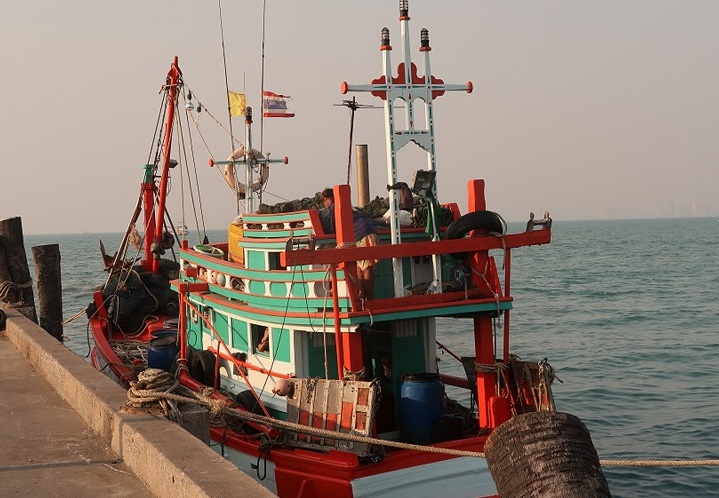International Buyers Must Prevent Thailand Backtracking on International Convention on Work in Fishing

A Thai fishing vessel. Photo: ILRF
Many people around the world have been horrified by reports of human rights abuses in the seafood industry. A 2014 article in the Guardian sounded alarm bells that all seafood purchasers large and small should answer. But the issue of slavery in the seafood supply chain is larger and more complex than consumers or even companies can tackle alone. Large multinational companies have had to band together to form the Seafood Taskforce, and yet government action is still needed.
This month, a European Union (EU) delegation will visit Thailand to evaluate any improvements made in its fishing sector, just as the National Fisheries Association of Thailand is waging a campaign against the need for further improvements. In 2015, the EU issued Thailand a yellow card for illegal, unregistered, and unregulated (IUU) fishing practices, which are often tied to labor abuses. They warned the Thai government to improve their practices or face a potential ban of Thai seafood entering the EU. Yet this review comes just as the Thai government is hesitating on its promise to ratify the International Labour Organization (ILO) Convention on Work in Fishing (C.188), which is essential to protecting the working conditions of fishers on Thai vessels and facilitating progress towards eliminating labor abuses in the supply chains of international brands sourcing from Thailand.
For Bon Appétit Management Company and the International Labor Rights Forum (ILRF), this issue is a simple one, unlike some other labor-rights concerns. The Thai government needs to ratify this convention and signal its commitment to fishers’ rights. To support this, we have signed an ILRF-drafted letter (which you too can sign via that link) encouraging the Thai government to follow through with its promise.
In recent years, numerous media outlets and NGOs have reported cases of forced labor and human trafficking in Thailand’s seafood industry, shedding light on unbearable working conditions, including up to 24-hour shifts, mental and physical abuse by supervisors, and a complete denial of freedom of movement to the point of shackling migrant fishers. A series of recent reports from Human Rights Watch and a network of local Thai civil society organizations have documented continuing abuse in the sector. With Thailand being one of the largest exporters of seafood globally, with a market share of $5.9 billion as of 2017, most prominent seafood brands in the world, including Bon Appétit Management Company, want to be able to continue buying from Thailand — but not without adequate safeguards against forced labor.
[D]espite some improvements, seafood supply chains still lack sufficient transparency, which puts corporations at risk of purchasing goods tainted by forced labor.
So, what can global brands do right now to ensure that they are not sourcing goods tainted with forced labor from Thailand? Direct engagement with suppliers is important. However, despite some improvements, seafood supply chains still lack sufficient transparency, which puts corporations at risk of purchasing goods tainted by forced labor.
It is therefore critical that the Thai government hear that brands expect ratification and implementation of ILO Convention 188, the only international convention that specifically covers working and living conditions on commercial fishing vessels. The implementation of ILO Convention 188 would help international buyers have more confidence in the products that they are sourcing from Thailand and would significantly reduce fishers’ risk of exploitation at sea.
Fishing is one of the most dangerous occupations, and human rights risks in seafood supply chains are difficult for brands and retailers to manage. If the Thai government were to ratify C.188 and establish strong national laws to provide the necessary protections to fishers, it would help to address the vulnerabilities that fishers face and lessen the sourcing concern from global buyers and international consumers. Thailand would be the first country in the region to ratify and implement C.188, joining the ranks of of other low- or middle-income countries such as Morocco, Namibia, Senegal, and South Africa and establishing Thailand as a leader on human rights in the fishing industry.
It’s important to recognize Thailand has made some improvements, and a recent Politico article quoted the Thai government claiming that they have “implemented robust labor monitoring mechanisms to protect against child labor, forced labor and human trafficking,” and that they “see that it is possible to comply with all international laws and standards.” If these statements are true, the Thai government should not hesitate any longer to ratify and implement ILO C.188.
Twenty-three NGOs and both international and local unions have issued statements urging the Thai government to follow through with C.188. These actors are experts on labor and human rights abuses. If leaders in the field are saying C.188 is essential to ensuring that the workers producing their seafood have decent conditions at work, the global brands sourcing from Thailand should join in supporting C.188. It makes business sense, and it is the ethical thing to do. At Bon Appétit, our public stand is to advocate for fishers by urging the Thai government to follow through on its promise to ratify ILO C. 188, and we hope other U.S. brands will consider joining.
Coauthored by Maisie Ganzler, chief strategy and brand officer of Bon Appétit Management Company, and Judy Gearhart, executive director of the International Labor Rights Forum